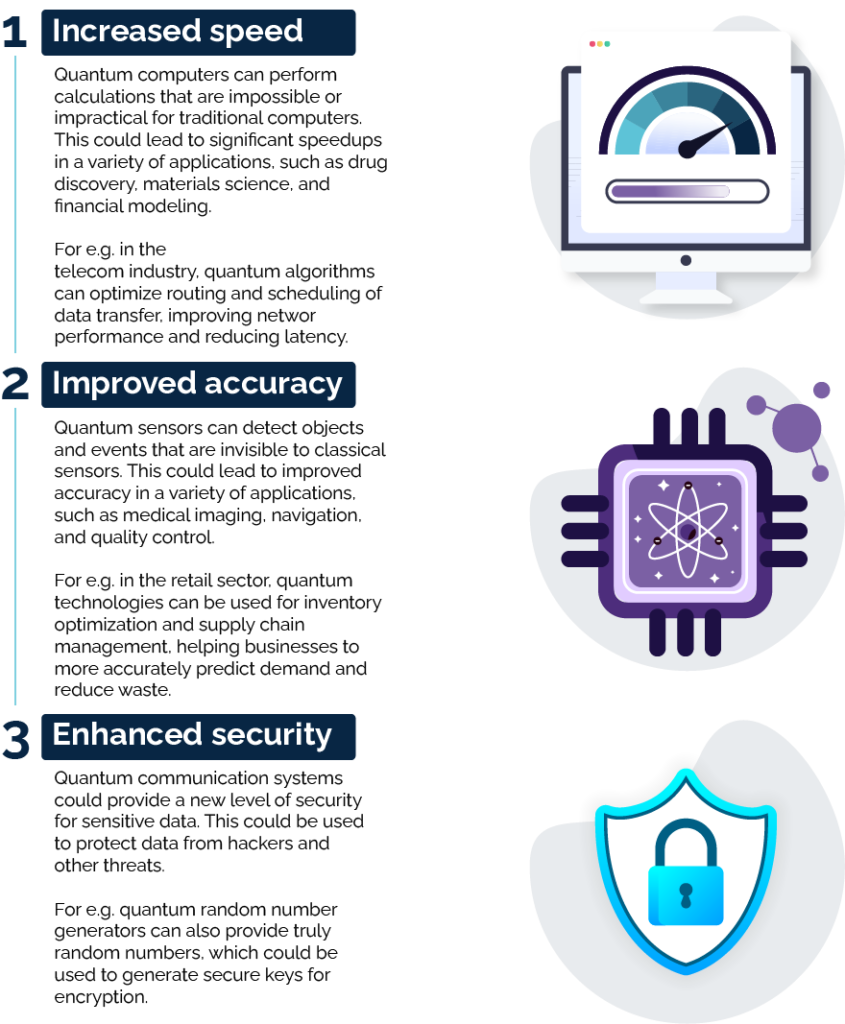In Brief
- Unleashing Real-Time Solutions: Quantum technologies offer real-time solutions through quantum computing, enabling businesses to solve complex problems and drive innovation in drug discovery, materials science, and financial modeling.
- Enhanced Accuracy and Security: By employing quantum sensing and communication, businesses can achieve improved accuracy in various applications and secure sensitive data with unbreakable encryption.
- Navigating Adoption Challenges: The adoption of quantum technologies, although promising, presents challenges like high costs, technical complexity, and regulatory uncertainty, necessitating careful ROI assessment and investment in training and education.
Quantum technologies are a new generation of technologies that exploit the unique properties of quantum mechanics to perform tasks that are impossible or impractical with classical technologies. In this article, we discuss how quantum technologies can offer businesses increased speed, improved accuracy, and enhanced security.
Understanding Quantum Technologies
Quantum mechanics is the fundamental theory of nature that describes the behavior of matter at the atomic and subatomic level. It is based on the idea that energy, matter, and information can exist in multiple states at the same time, and that these states can be linked together in complex ways.

Quantum technologies have the potential to transform businesses across industries by enabling new capabilities in computation, communication, sensing and encryption.
Quantum computers, for example, could be used to solve complex problems that are currently impossible for traditional computers to handle. This could lead to breakthroughs in areas such as drug discovery, materials science, and financial modeling.
The Applications of Quantum Technologies in Business
The potential impact of quantum technologies is vast, and it is still too early to say exactly how they will be used in the future. However, it is clear that they have the potential to transform many industries and improve our lives in ways that we can only imagine.
Here are some specific examples of how quantum technologies could impact businesses across industries:
- Pharmaceuticals: Quantum computers could be used to design new drugs and treatments for diseases.
- Materials science: Quantum simulations could be used to design new materials with improved properties, such as strength, lightness, or conductivity.
- Finance: Quantum computers could be used to model complex financial systems and make more accurate predictions about the future.
- Manufacturing: Quantum sensors could be used to inspect products for defects and ensure quality control.
- Transportation: Quantum navigation systems could be used to guide vehicles more safely and efficiently.
- Security: Quantum communication could be used to create unbreakable encryption that protects sensitive data from hackers.
These are just a few examples of the many ways that quantum technologies could impact businesses across industries. As this field continues to develop, we can expect to see even more innovative and transformative applications in the years to come.
The Benefits of Quantum Technologies for Businesses
Quantum technologies have the potential to offer businesses a number of advantages, including increased speed, improved accuracy, and enhanced security.

Incorporating quantum technologies into business strategies can drive innovation, optimize processes, and open new doors for growth and success.
As technology continues to advance, businesses that embrace quantum technologies stand to gain a significant advantage in their respective industries.
- New product and service development: Through quantum technologies, businesses can unlock the potential to create entirely new products and services that were previously not feasible. This could lead to the discovery of new markets and untapped revenue streams.
- Improved efficiency: Quantum technologies have the potential to significantly improve existing business operations, resulting in increased efficiency, reduced costs, and ultimately, increased profits.
- New insights into the world: Quantum technologies allow for a deeper understanding of the world we live in, providing businesses with unprecedented insights and the potential for new discoveries across a broad range of fields.
The Challenges of Adopting Quantum Technologies
Quantum technologies offer unprecedented opportunities for businesses to enhance their performance, innovation, and competitiveness. However, adopting quantum technologies also poses significant challenges, such as high cost, technical complexity, and regulatory uncertainty.
Cost: One of the main challenges that businesses face when trying to adopt quantum technologies is the high cost of acquiring, maintaining, and operating quantum devices and systems.
Quantum technologies require specialized hardware, software, and infrastructure that are often expensive and scarce. Moreover, quantum technologies are still in their early stages of development and may not be compatible with existing systems and standards.
Therefore, businesses need to carefully assess the return on investment (ROI) of adopting quantum technologies and allocate sufficient resources and budget for their implementation.
Complexity: Another challenge that businesses face when trying to adopt quantum technologies is the technical complexity of understanding, developing, and using quantum applications.
Quantum technologies are based on the principles of quantum physics, which are often counterintuitive and difficult to grasp for non-experts. Moreover, quantum technologies require advanced skills and expertise in fields such as mathematics, computer science, engineering, and physics.
Therefore, businesses need to invest in training and education for their employees and partners to build their quantum literacy and capabilities.
Regulatory barriers: A third challenge that businesses face when trying to adopt quantum technologies is the regulatory uncertainty and risk associated with quantum applications.
Quantum technologies have the potential to disrupt various industries and sectors, such as cybersecurity, finance, health care, and defense. However, the legal and ethical implications of quantum technologies are not well understood or defined yet. Moreover, quantum technologies may pose threats to privacy, security, and sovereignty if not used responsibly and ethically.
Therefore, businesses need to comply with existing regulations and standards related to quantum technologies and engage with relevant stakeholders such as governments, regulators, customers, and competitors to shape the future of quantum governance.
Key Takeaways
As quantum technologies continue to develop and mature, they will become increasingly relevant and accessible to businesses across industries. Organizations that embrace quantum technologies and develop their quantum literacy, capabilities, and partnerships will be better positioned to succeed in the dynamic and fast-changing global market.
References:
Clearing the way toward robust quantum computing












